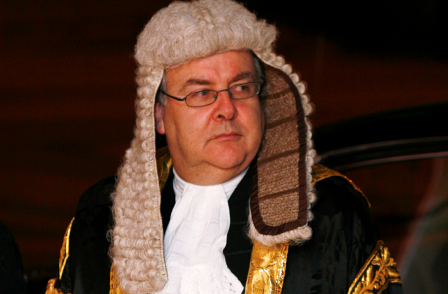
Former Lord Chancellor Charles Falconer has said the police were wrong to use the Regulation of Investigatory Powers Act to seize phone records and identify sources of The Sun and Mail on Sunday.
Falconer was a member of the Labour Government which brought in RIPA and he said told Radio 4's Today Programme that clearer protections for journalistic sources should have been included in the “code of conduct” when the law was enacted. A review of that code was yesterday promised by the Home Office and Falconer said it should now state clearly that when identification of journalistic sources is an issue, police should seek the permission of a judge.
Asked whether the use of RIPA against journalists working for The Sun and the Mail on Sunday was an appropriate use of the legislation, Falconer said: “On the face it no. There are provisions in other legislation which say where there is an issue about identifying a journalistic sources the application for that material should go before a judge so the judge can balance the public interest in making sure there is a proper investigation against the need to protect journalistic sources.
“Going and using RIPA involves no such balance. The police can authorise it themselves so nobody ever considers the balance of, for example, protecting sources.
“And both of these cases didn’t involve any degree of urgency, you can imagine in an urgent case it might be appropriate not to go before a judge but neither of the two cases – which is the Plebgate case and the Huhne case – involved any degree of urgency.
“And in relation to the Huhne case there had been earlier applications in which the judge had taken great steps to ensure that the identity of a source was redacted. It does look like this is not a proper use of the powers.”
Falconer said that proper safeguards should have been included when RIPA it was first brought in: “The way it should have been dealt with was in drawing attention to a code of conduct…it should have said in the code of conduct, where the identification of journalistic sources is an issue – then you should go to a judge.”
Former chief constable of British Transport Police Andy Trotter said he believes “police here have used the legislation entirely properly when you look at the seriousness of the cases they were dealing with”.
Trotter (now retired) was until recently the media lead at the Association of Chief Police Officers. He said the Huhne case involved “a senior politician and a judge going to jail for serious offences” and on the Plebgate case he said there was a “conspiracy to unseat a Cabinet minister”.
However, the Operation Alice closing report by the Met Police did not make any suggestion that the three officers sacked for directly and indirectly leaking information to The Sun were involved in any such conspiracy. The Crown Prosecution Service said they acted in the public interest.
Asked why the police used RIPA in these two cases, rather than going to a judge under the Police and Criminal Evidence Act, Trotter said: “That matters not as far as this legislation is concerned. It’s about dealing with serious crime and making sure that all the evidence available comes out for victims and the accused to ensure nothing is kept away from the judicial process…
“I do agree with Lord Falconer that perhaps this does need a review, looking at PACE when you compare it to RIPA I think there is a case for saying should we look at a different standard of authorisation and that may well come out of the reviews that are being undertaken now.”
But Falconer said that what Trotter said “illustrates how bad the problem is…he is saying as long as it is a serious crime you can just override the protections for journalistic sources.
“Each case apart from the urgent cases requires a balance to be struck in relation to whether or not the source should be revealed against the investigation of the crime.
"And the police can’t do that because they are the people who concerned with investigating the crime. Somebody else needs to hold the balance and as long as its not urgent that should be done by a judge.”
“The attitude expressed by Andy, which is the attitude of the police, is who cares about that – if it’s a serious crime, go straight for it – and that is wrong because it means that sources for journalists will now believe that if there is a crime involved, not by them but by somebody else, the fact for example that they have been a whistleblower will be revealed.”
Trotter said: “The legislation quite clear, whether it needs amendment is another matter. The police have a duty to consider all leads in these matters, to reveal evidence for the court and prosecution and I think they have done it in this case.”
 He also said there is “full oversight” of use of RIPA by the Interception of Communications Commissioner.
He also said there is “full oversight” of use of RIPA by the Interception of Communications Commissioner.
However, the Interception Commissioner revealed last month that he does not know how many times police have used RIPA to request the phone records of journalists.
Yesterday, all police chief constables were ordered by the Commissioner to disclose incidents where RIPA has been used to identify journalistic sources.
Head of the Interception Commissioner’s office Joanna Cavan acknowledged the role Press Gazette has played in bringing about the inquiry, saying the Save Our Sources campaign had "helped to highlight public concerns".
Email pged@pressgazette.co.uk to point out mistakes, provide story tips or send in a letter for publication on our "Letters Page" blog
